Uncover the mystery of coffee's absence in the Bible and explore the historical insights behind its global journey.

Is Coffee in the Bible
Did you know over 2.25 billion cups of coffee are consumed worldwide every day?
This staggering statistic might make you wonder about coffee's place in history, especially in ancient texts like the Bible.
While the Bible mentions various foods and beverages, the question of whether coffee is among them is intriguing.
Given coffee's geographical origins and its absence in regions mentioned in the Bible, you might find the exploration of this topic reveals more about cultural practices and trade routes of biblical times.
Let's embark on a journey to uncover the historical and cultural context that might explain this silence.
Key Takeaways
- Coffee is not mentioned in the Bible, highlighting historical and cultural dietary norms.
- Biblical times favored beverages like water, wine, and milk over coffee.
- The absence of coffee in biblical texts reflects its later historical emergence and spread.
- Understanding scriptural silences on coffee offers insights into evolving dietary customs and societal changes.
The Historical Timeline of Coffee
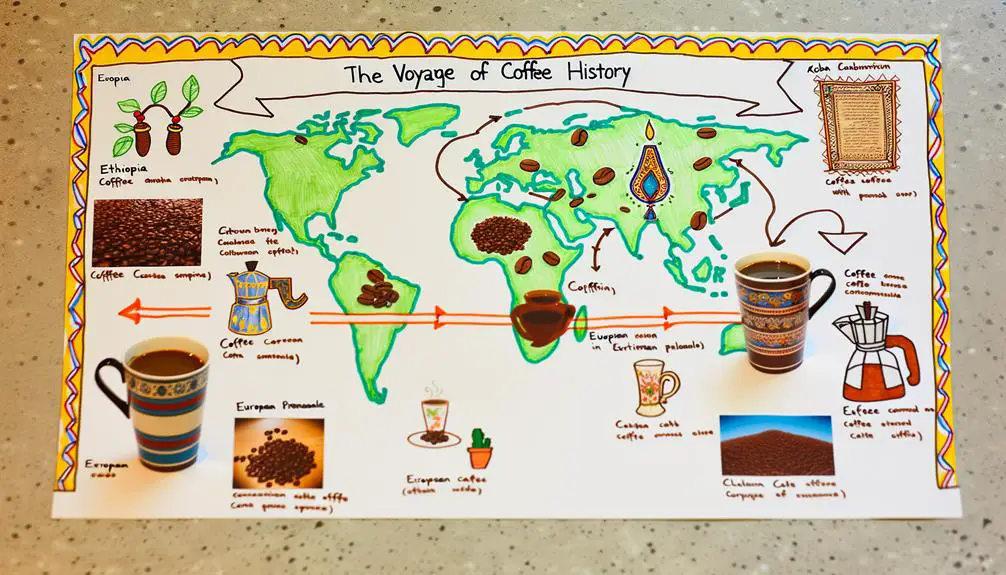
Tracing the origins of coffee reveals a complex journey that spans centuries and continents, reflecting its significant impact on societies around the globe. This journey begins in the ancient coffee forests on the Ethiopian plateau, where legend suggests a goat herder named Kaldi first discovered the potential of these beloved beans. The transition from wild discovery to deliberate cultivation marks a pivotal point in the history of coffee. Coffee cultivation, initially a closely guarded secret within the Arabian Peninsula, gradually spread across the globe, adapting to new lands and cultures.
As coffee cultivation evolved, so too did methods of preparation and consumption, paving the way for its role in modern society. By the 15th century, coffee had made its way to the Arabian Peninsula, thriving in the Yemeni climate. It was here that coffee beans were first roasted and brewed, similar to how we enjoy coffee today. This innovation spread rapidly across the Middle East, to Europe, and eventually to the New World, altering social practices and spurring the growth of coffeehouses, which became centers of intellectual exchange.
The spread of coffee cultivation played a crucial role in the colonial expansion of European powers, with plantations established in the Caribbean, South and Central America, and Asia. These developments laid the groundwork for modern consumption patterns, where coffee isn't just a beverage but a global commodity, deeply integrated into the economic, social, and cultural fabric of societies worldwide. The story of coffee, from its origins to its modern-day significance, is a testament to its enduring appeal and its complex role in shaping human history.
Biblical References to Beverages

Having explored the historical journey of coffee, let's now examine its presence, or absence, in the biblical narrative, focusing on references to beverages within the scriptures. The Bible, rich with symbolic references and rituals, frequently mentions various beverages, most notably water and wine, each carrying profound symbolic and practical significance.
Water, essential for life, often symbolizes purification and life-giving properties in the scriptures. It's central to several key events and rituals, highlighting its spiritual significance. For instance, water rituals, such as baptism, signify purification and initiation into a new life. Wine, on the other hand, holds a place of honor in biblical texts, symbolizing joy, celebration, and the covenant between the divine and humanity. Its significance is most vividly illustrated in the Last Supper, where wine becomes a symbol of the new covenant in Jesus' blood.
Below is a table summarizing the symbolic meanings of these two primary beverages mentioned in the Bible:
Beverage |
Symbolic Meaning |
|---|---|
Water |
Purification, Life |
Wine |
Joy, Covenant |
This analysis underscores the absence of coffee or similar beverages in biblical texts, emphasizing the centrality of water and wine in ancient rituals and symbolism. Their profound meanings and uses within the scriptures highlight the cultural and spiritual landscape of the times, offering insights into the values and practices of biblical societies.
As you delve deeper into the biblical narrative, it's clear that while coffee doesn't find a mention, the references to water and wine provide a rich tapestry of symbolic meanings, deeply intertwined with the spiritual and daily lives of the people.
Coffee's Geographical Origins
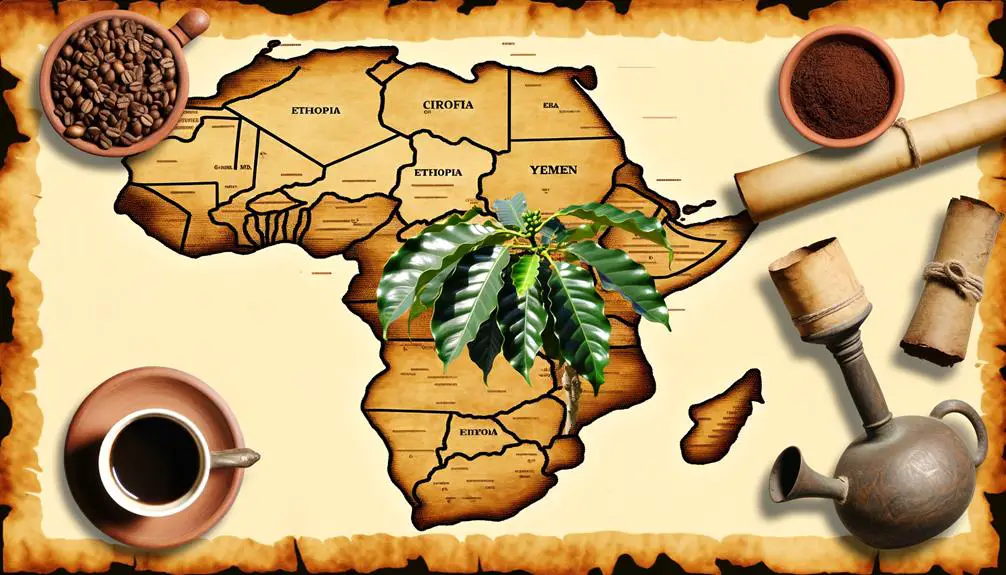
To understand coffee's global journey, it's essential to explore its origins in the ancient coffee forests of Ethiopia. This region, often celebrated as the birthplace of coffee, offers a unique insight into the plant's evolution and its journey to modern cultivation. The story of coffee begins with its wild ancestors in the lush landscapes of Ethiopia, where it wasn't just a plant but a piece of the cultural fabric.
Analyzing coffee's origins, you'll find that its journey from wild bushes to cultivated fields highlights a fascinating transition influenced by both natural selection and human intervention. This interplay between plant evolution and human cultivation practices has shaped the coffee we enjoy today. The historical path of coffee from Ethiopia to the rest of the world is a testament to its significance across cultures and economies.
To add depth to this exploration, consider the following points:
- The genetic diversity of coffee in Ethiopia is unmatched, offering insights into plant evolution.
- Early methods of coffee cultivation in Ethiopia set the stage for modern agricultural practices.
- The shift from wild to cultivated coffee has implications for both biodiversity and coffee production.
These elements underscore the importance of Ethiopia not just as the geographical origin of coffee but as a living laboratory for understanding plant evolution and the development of modern cultivation techniques. As you delve into the story of coffee, it's clear that its journey is deeply intertwined with human history, shaping and being shaped by societies across the globe.
Ancient Trade Routes and Commodities
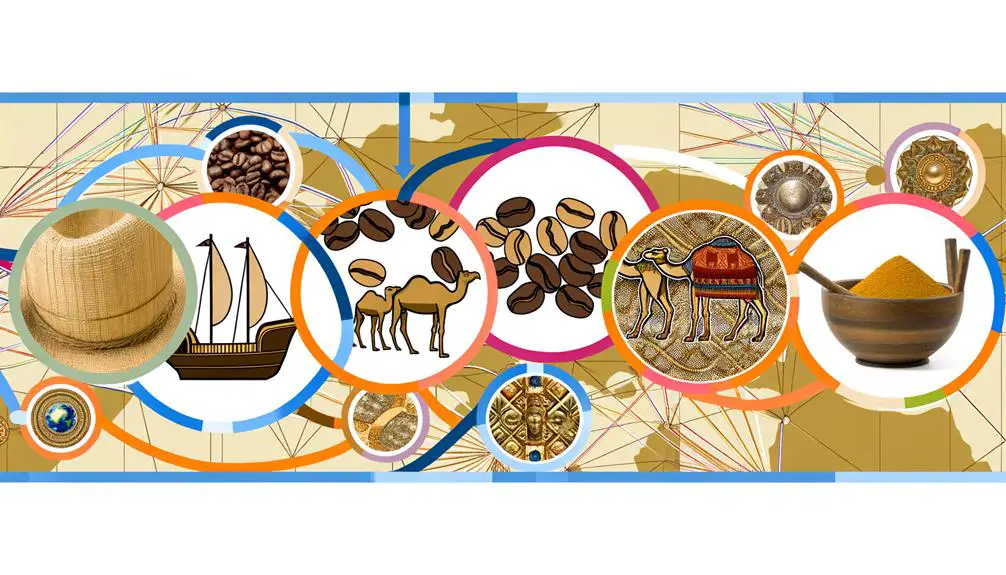
Exploring the ancient trade routes reveals how coffee, among other commodities, was integral to the economic and cultural exchanges that shaped civilizations. The spice trade and the Silk Road were particularly crucial in connecting distant parts of the world, facilitating not just the movement of goods like spices, silk, and precious metals, but also enabling the diffusion of ideas, technologies, and cultures across continents.
The spice trade, for instance, wasn't just about transporting valuable seasonings from the East to the West. It was a complex network of trade routes that also saw commodities like coffee being traded from their places of origin to markets where they were unknown. This exchange significantly impacted the social and economic structures of the societies involved, leading to the emergence of powerful trading cities and the accumulation of immense wealth by those controlling the routes.
Similarly, the Silk Road, named for the lucrative silk trade, was about more than just textiles. It was a vast network of trade routes that stretched from China all the way to the Mediterranean, passing through a variety of landscapes and cultures. Along this route, coffee, among other goods, traveled, facilitating interactions between diverse peoples and contributing to the rich tapestry of global culture.
These ancient trade networks were the lifelines of their time, driving the economy, influencing politics, and shaping the social fabric of the civilizations they touched. They underscore how commodities like coffee were more than just goods; they were catalysts for change, connecting the world in unexpected and profound ways.
Cultural Practices in Biblical Times
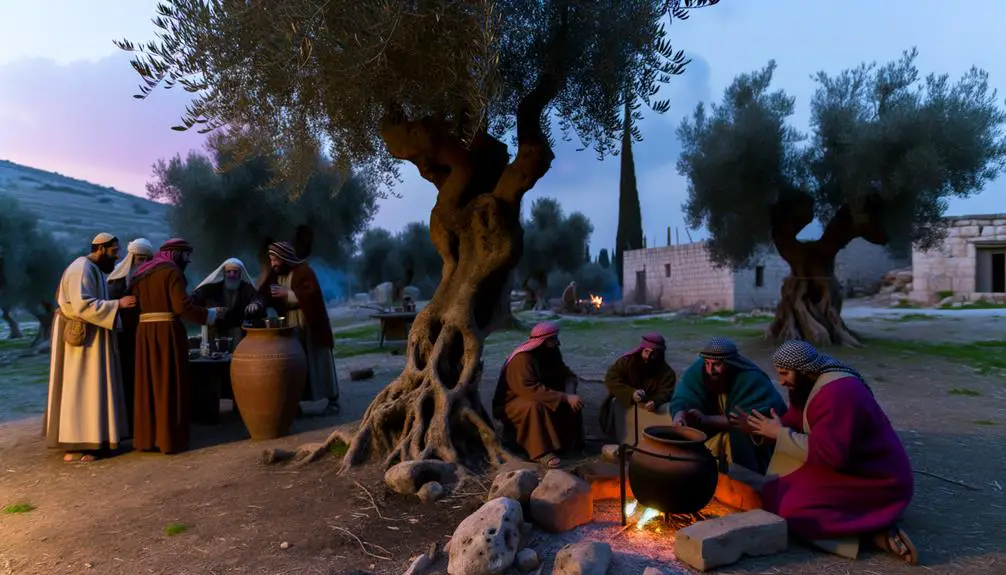
Understanding the cultural practices in biblical times requires a deep dive into the daily life, religious observances, and social customs that shaped the ancient Near Eastern societies. These communities were deeply intertwined with their environment, relying heavily on agriculture for sustenance and economic stability. This reliance is reflected in the numerous agricultural rituals observed, which weren't only practical in nature but also carried deep spiritual significance.
Feast preparations in these societies were elaborate affairs, often tied to religious festivals and harvest celebrations. These events served as an essential means for reinforcing social bonds and communal identities. They were meticulously planned, involving the entire community in the process, from the gathering of ingredients to the final feast.
To further understand these practices, consider the following aspects:
- Agricultural rituals: These were integral to ensuring a bountiful harvest and often involved prayers, offerings, and ceremonies dedicated to deities associated with fertility and harvest.
- Feast preparations: The community's collective effort in preparing for feasts highlighted the importance of food not just as sustenance but as a means of cultural expression and religious observance.
- Social customs: Daily life was governed by a complex set of social customs that dictated everything from interpersonal interactions to the division of labor within the community.
Analyzing these practices reveals the intricacies of life in biblical times, emphasizing the importance of agriculture and communal celebrations in shaping the social and religious fabric of ancient Near Eastern societies.
Interpreting Silence on Coffee

You must consider the absence of coffee in biblical texts within its historical and cultural context.
Analyzing scriptural silences reveals much about beverage habits during biblical times and the cultural contexts of consumption.
This approach allows you to understand the significance of what isn't mentioned as much as what's documented.
Biblical Times Beverage Habits
While the Bible doesn't mention coffee, analyzing beverage habits during biblical times reveals a reliance on water, wine, and milk, suggesting a different cultural context for drinks. This era's beverage choices weren't merely about quenching thirst or enjoying flavors; they were deeply integrated into the cultural, religious, and health practices of the time.
Water purification methods were essential for ensuring the safety and ritual cleanliness of drinking water.
Wine played a significant role in religious ceremonies and feast preparations, symbolizing joy and celebration.
Milk, often from goats or cows, was a staple nourishment, reflecting pastoral lifestyles.
These beverages were critical in daily life, health, and spiritual practices, illustrating a complex relationship between people and their consumption habits.
Analyzing Scriptural Absences
Although the Bible doesn't explicitly mention coffee, its absence can offer insights into the historical and cultural context of biblical times. Delving into scriptural interpretations, you'll find that the beverages and foods mentioned are often symbolic, reflecting the available resources, traditions, and rituals of the era.
This silence on coffee, discovered much later than the biblical canon was written, underscores the evolving nature of societal customs and consumption habits. By examining what isn't mentioned, scholars can better understand the shifts in dietary norms over centuries. This approach also allows for drawing modern parallels, illustrating how cultural staples evolve.
Understanding the absence of coffee in the Bible, therefore, enriches our grasp of historical context and its influence on scriptural narratives.
Cultural Contexts of Consumption
Exploring the silence on coffee within biblical texts reveals broader cultural contexts of consumption that have shifted significantly over millennia. This silence speaks volumes about the evolution of dietary norms and the advent of new beverages like coffee. Analyzing these shifts allows for a deeper understanding of:
- The historical emergence of coffee and its integration into various cultures.
- Modern implications of coffee consumption on societal norms and daily rituals.
- Ongoing health debates surrounding coffee, contrasting ancient dietary laws with contemporary nutritional science.
These aspects underscore the complex interplay between tradition, innovation, and health in the realm of dietary habits. They also highlight how something as commonplace as coffee can spark significant discussions about cultural identity, social practices, and evolving perceptions of health and wellness.
Frequently Asked Questions
How Have Modern Religious Groups Interpreted the Absence of Coffee in the Bible for Their Dietary Laws or Restrictions?
Modern religious groups have varied interpretations of coffee's absence in the Bible, particularly concerning dietary laws or restrictions.
You'll find that some see its omission as irrelevant to its permissibility, focusing instead on health implications and cultural symbolism.
Others, however, may view the absence as a sign that it's not divinely endorsed.
This analytical approach helps you understand the nuanced ways religious communities navigate modern dietary choices within their spiritual frameworks.
Are There Any Parables or Teachings in the Bible That Could Metaphorically Relate to the Cultivation or Consumption of Coffee?
You're venturing into a realm where the scent of coffee intertwines with ancient texts. The Bible, rich with symbolism, doesn't directly mention coffee. Yet, its teachings on cultivation and consumption could metaphorically embrace coffee's essence.
Analyzing Biblical beverages reveals a mosaic of spiritual nourishment and community, inviting a scholarly comparison. Could coffee symbolism find its roots here, mirroring the communal and revitalizing spirit of these age-old libations?
The analysis beckons.
How Might the Introduction of Coffee Have Changed Religious Ceremonies or Gatherings if It Had Been Known During Biblical Times?
If coffee had been known during biblical times, it might've significantly impacted religious ceremonies or gatherings. Its origins and agricultural implications could've influenced communal gatherings, offering a new ritual element.
Imagine the integration of coffee into fellowship, enhancing alertness and social interaction. This introduction could've shaped religious practices, potentially leading to its ceremonial use.
Analyzing this scenario, it's intriguing to consider how such a stimulant would've fit into ancient religious contexts.
What Are the Parallels Between the Communal Aspects of Coffee Consumption in Today's Society and the Communal Practices Described in the Bible?
Like a river weaving through a community, coffee's role in today's society mirrors the communal practices highlighted in the Bible.
You'll find that the ritual significance of gathering around a cup of coffee strengthens social bonds, much like the communal meals and ceremonies of biblical times.
Analyzing these parallels, it's clear that the essence of forming connections over shared rituals has always been a cornerstone of human interaction.
Has the Absence of Coffee in the Bible Influenced the Beverage's Perception or Acceptance in Historical Religious Contexts?
You might wonder if the absence of coffee in the Bible has shaped its perception or acceptance in religious contexts historically.
It's intriguing to consider how coffee's origins and its exclusion from biblical narratives might've influenced its role in religious rituals.
Though not mentioned in sacred texts, coffee has carved its own path in communal gatherings, potentially offering a modern parallel to ancient communal practices, despite its scriptural absence.
Conclusion
As you've seen, there's no direct mention of coffee in the Bible. Its origins and the timeline don't quite align with biblical times, making its absence understandable. Interestingly, the silence on coffee in scripture coincides with its later emergence along ancient trade routes, far from the biblical epicenters.
This gap in the historical narrative isn't a mystery but a fascinating coincidence, highlighting the evolution of global commodities and cultural practices long after the biblical era. Analyzing these patterns provides a unique lens into history's interconnectedness.


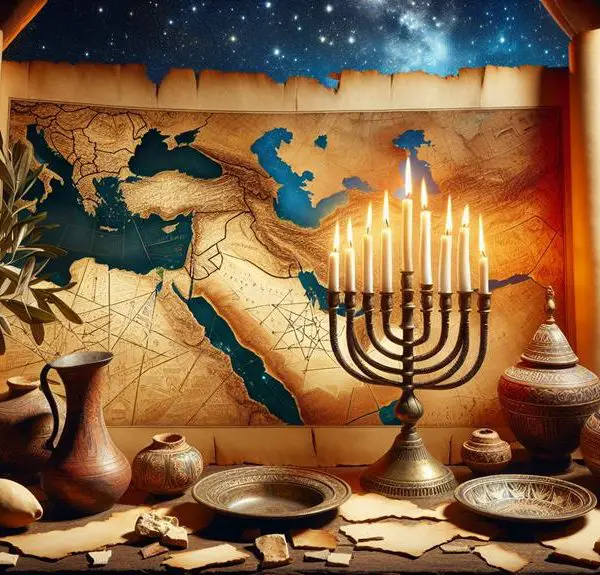
Sign up